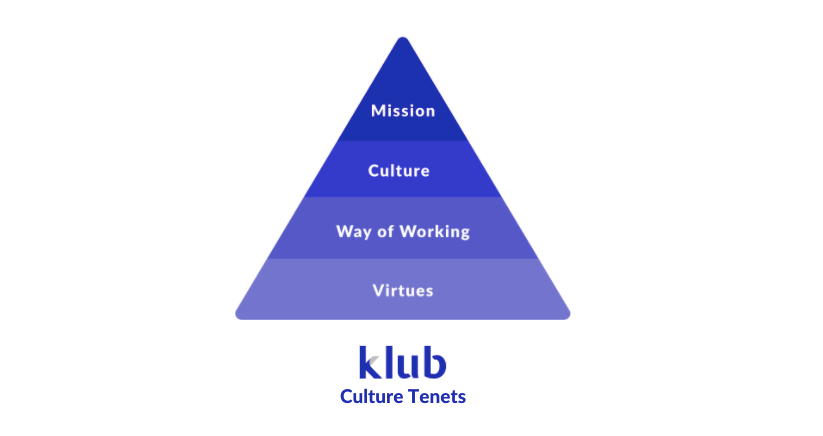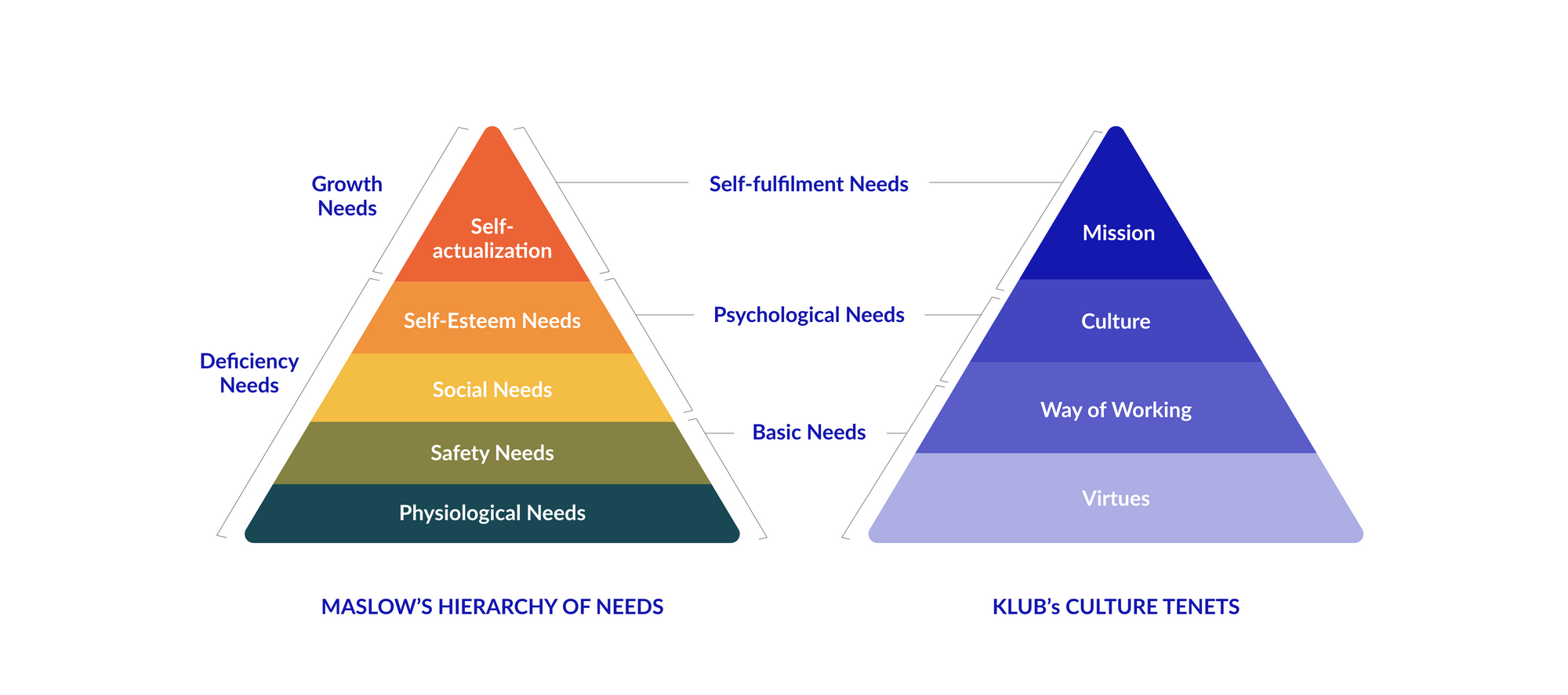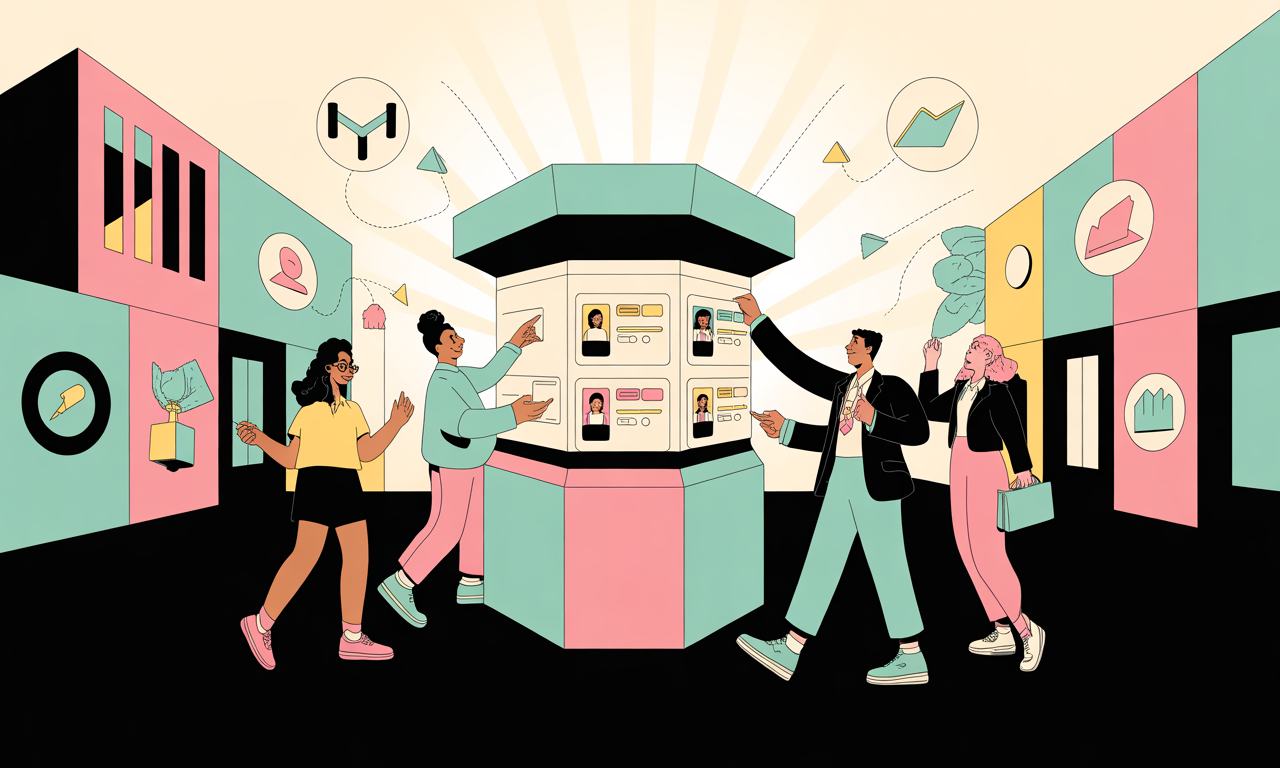
People & Culture
How Maslow's model of human needs inspired the four-tiered culture model at Klub
Fri Mar 05 2021
5 min read
Startup cultures are important. They are the push & pull between extreme efficiency & the acknowledgement of humanness. The culture set in the early days shapes the way the organisation will function for years to come - and the first 20 team members end up becoming the torchbearers of this culture. The values that you set as a precedent enable your team to achieve its maximum potential in the future. At Klub, we've worked out a four layered cultural model wherein each layer relies on the previous one to hold true - very similar, in fact, to Maslow's model of human needs.

Virtues
The bedrock of our model is the Virtues - you either have them or you don't. Virtues are something only life itself can instill in you [yes, we're deep like that]. Here are the 5 traits that we hold in high regard:
Fire in the belly - The innate hunger - to learn, to grow, and to strive to be a better version of yourself.
Hard Work - The compulsive need to perform - so that your average is higher than the max of most people.
Trustworthiness - Being a high integrity individual. Be someone who builds trust and expects to be trusted in return.
Intellectual curiosity [is your superpower] - Have a growth mindset. When you're working with a startup, you'll end up working on multiple different functions - all in one day. Finding joy in learning new things & developing your skill-set to be more proficient is the only way forward.
Humility - As Aristotle rightly said, 'The more you know, the more you realize you don't know'. Intellectual humility is the ultimate key to personal growth.
Way of Working [WoW]
Our way of working as a team is something we hold sacrosanct. This is something any new member ends up learning within weeks of joining us. It's important because it affects every aspect of our work, and every team at work. Here are the 5 skills that make up Klub's WoW:
High A2D [Attention to Detail] - Highly conscientious individuals strive to produce zero defect work, consistently.
Structured thinking - High performers have the ability to prioritise and de-clutter different threads [parallelly, and sequentially]. It's important, in a high growth startup, for you to work on projects horizontally [multiple at the same time] as well as vertically [in-depth].
Clear communication - Make clear communication - from active note-taking, to having clarity of thought. Set good timelines and communicate delays effectively.
Extreme ownership - Get things done! And after, pitch in to help others where needed. We succeed when each of us does well individually and when we help each other as a team.
Positivity spreader - Startups are tough. It's not all rainbows and butterflies, but some of it is. Use humour and camaraderie to make the hard work fun. Take feedback in your stride and use it to better yourself.
Culture
While onboarding new team members, we go through a thorough culture round with the individuals. An affirmative response to the question of a cultural fit means that the individual meets the team's social & work expectations, thereby strengthening the organisation overall. Here are some qualities we aspire to maximise as a group:
Think BIG and execute small - Have lofty ambitions and aspirations. Work towards those goals step-by-step. The grandeur of the vision can only be fulfilled by methodical and flawless execution of tiny movements.
Deliver high-velocity output and high-quality output - Be focused on delivering output every day that moves Klub forward and that does not have to be re-done. The best professionals are able to deliver both high velocity and high quality output.
Be objective and retain emotionality - Startups require both objectivity and grit in equal measure. Decision-making has to be objective. Contribute to the decision but 'disagree and commit' if the decision is not to your liking. At the same time, retain your human-ness by being passionate and having grit to make Klub succeed.
Always be building and always be selling - We thrive on innovation and on our ability to make ourselves relevant for the market. Keep iterating and improving. Represent yourself and Klub in the best manner possible every time.
Raise the bar for yourself and for others - Don’t become the lowest bar - push yourself and others to a higher norm.
Mission
Finally, an individual at Klub gets to the mission of the organisation: Keeping the virtues, way of working, and culture in mind, we check whether an individual identifies with the organisation's larger mission statement.
Our mission is quite simple: it is to empower growth for loved consumer brands.
We ask new team members what local brands mean to them. Do they buy from any specific local brands, or follow a specific brand's journey? Do they feel passionately about helping these brands grow? Are they part of any local communities that support brands?
Enter, Mr. Maslow. We saw a parallel between Maslow's model for human needs and applied it to an organisation. That gave us Klub's cultural tenets!
Maslow's hierarchy of needs is a motivational theory in psychology comprising a five-tier model of human needs, often depicted as hierarchical levels within a pyramid. The pyramid features 3 main sections: Basic Needs, Psychological Needs, and Self-fulfilment Needs. Needs lower down in the hierarchy must be satisfied before individuals can attend to needs higher up. Maslow's theory, when applied in an organisational context, brings you Klub's Culture Tenets.

In Maslow's theory, the basic needs comprise of physiological & security needs. According to Maslow, the former is the most important one, and all other needs become secondary until these needs are met - this is true for Virtues. The latter defines the need for order, predictability, and control in Maslow's pyramid. When you work with a startup, none of those things exist - so an individual's Way of Working becomes their strongest asset to build structure & order within the organisation.
Next, the psychological need on Maslow's pyramid: This is the need for connection, collaboration, and a sense of belonging. This, in an organisation, is facilitated by its Culture. The right culture allows people to collaborate better, lift each other up, and do better as a team - and most importantly, the right culture ensures they're having fun while they do it.
When there's a culture fit, it boosts team morale, and ensures the team individually & collectively achieves its maximum potential. This brings us to the final point: self actualisation. Maslow describes this level as the desire to accomplish everything that one can, to become the most that one can be. The right virtues, ways of working, and culture help a team get to this level, where individuals aspire to achieve the impossible. When this drive is aligned with the organisation's goals, you end up in a win-win situation: your team achieve.
It's important that this mission is established at an early stage, so you can determine whether your team identifies with it. If there's a mis-match there, having the right virtues, ways of working, and culture may not be enough.








